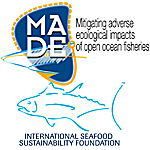Biodiversity is believed to be positively correlated with ecosystem resilience. Because biodiversity data can be challenging to collect, biodiversity indicators are valuable predictors of ecosystem state. This is particularly true for oceanic ecosystems. We explore the potential for using yellowfin tuna (Thunnus albacares) as an indicator of biodiversity by linking ecological characteristics of tuna (e.g. distribution and abundance) to diversity indices calculated from an existing dataset. These data were collected from NOAA Fisheries ships at sea during 10 years over a 19-year time span (1988-2006) in the oceanic eastern tropical Pacific, an area of 21 million square km that includes waters of 12 nations and the oceanic commons. We characterize diversity of cetaceans, seabirds, larval fishes, and flyingfishes and relate these to yellowfin tuna metrics. Because of the close ecological association of these tuna with dolphins in this region, our results have particular relevance to depleted populations of spotted and spinner dolphins (Stenella attenuata and S. longirostris, respectively), but more broadly, to ecosystem-based management of oceanic systems. These ecosystems present a complex set of management challenges. The living marine resources they include are often transboundary; enforcement of international agreements is difficult; and the ecosystem goods and services they provide are global. Yellowfin tuna is a commercially important species and tuna information is widely available through fisheries datasets, providing the potential to predict ecosystem state for this system into the future.
- Presentation

 PDF version
PDF version
